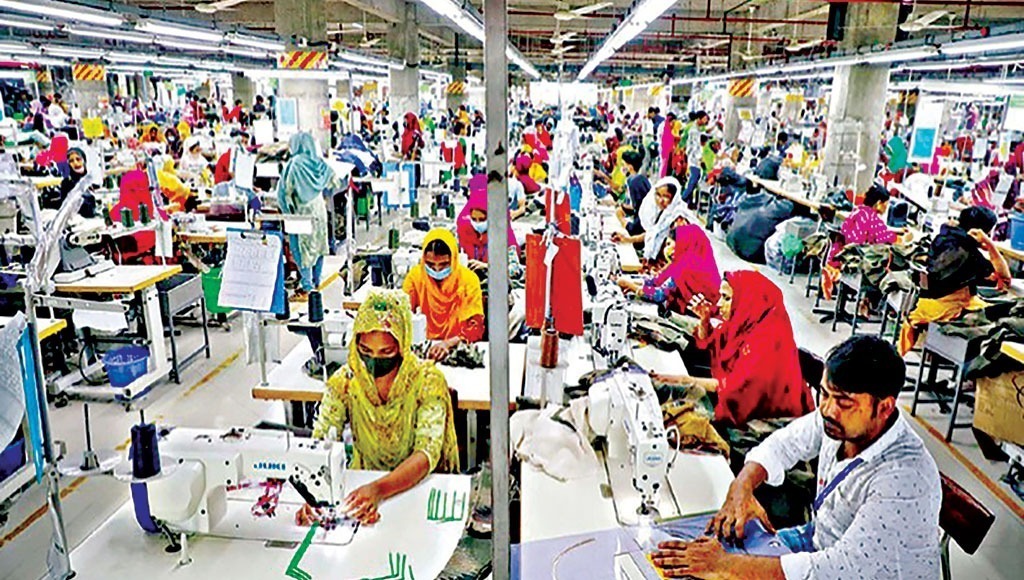Preparations needed to address 4IR automation job losses: experts

Experts at a programme on Saturday said that Bangladesh should make timely preparations to address the job losses automation could cause in the readymade garment and textile sector.
According to a study report released at the inaugural ceremony of a two-day symposium titled ‘The 4th Industrial Revolution: impact on workers and employment and the need for inclusive policies’, automation could displace 60 per cent of the workforce in Bangladesh’s RMG and textile sector from their traditional roles by 2041 although a significant number of new types of jobs would emerge in the sector during this period.
The Bangladesh Institute of Labour Studies in collaboration with the International Labour Organisation organised the event at the CIRDAP auditorium in the capital Dhaka.
Experts stressed the urgent need for government action to protect, upskill and reemploy workers facing both short- and long-term risks from the 4th Industrial Revolution.
They called for the involvement of workers, trade unions, employers and the civil society in this process.
Skill development was highlighted as a key priority, requiring strategic planning for successful implementation.
Labour secretary AHM Shafiquzzaman said that that Bangladesh must align itself with the global shift towards the 4th Industrial Revolution, stressing that now is the time to make necessary preparations.
He underscored the importance of making timely policy decisions to mitigate the risks to workers’ employment arising from the 4th Industrial Revolution, while also leveraging technology to benefit the country.
Information and Communication Technology Division additional secretary Abu Sayed Md Kamruzzaman said that it was crucial to define the term ‘worker’ accurately and establish ethical standards for the use of artificial intelligence.
The event was presided over by BILS vice-chairman Md Mujibur Rahman Bhuiyan, with the opening speech delivered by BILS executive director Syed Sultanuddin Ahmed.
The study revealed that up to 5 lakh jobs at the operator level, including those handling single and double needle lockstitch machines, chain stitch machines, and sewing mechanics, were at risk in the apparel and textile sector.
It also found that floor supervisors and pattern makers could see a loss of 10,000 positions, with another 10,000 jobs in quality control, production planning and merchandising potentially disappearing as well.
Even high-skilled roles, including fashion designers, CAD-CAM operators, portfolio developers, and production controllers are not immune, with an additional 10,000 jobs at risk, said the report which was presented by iSocial Limited chief executive officer Ananya Raihan at the programme on Saturday.
He said that in 2022, the machine-to-human work ratio was 44 per cent to 66 per cent, respectively, but by 2035, it was expected to shift to 57 per cent and 43 per cent.
The report highlighted alarming job losses due to automation across five major industries: the RMG and furniture sectors, each projected to lose 60 per cent of jobs, the agro-food processing industry with a 40-per cent reduction, the leather sector facing a 35-per cent decline and the tourism sector anticipating a 20-per cent job loss.
The report said that the automation in the RMG and textile sector was creating new jobs that combine technology with traditional manufacturing processes.
Key emerging occupations include professionals skilled in computer-aided process planning, quality control, and training, as well as those working with automated inspection and material handling systems, it said.
According to the report, jobs such as artificial neural network experts, pick-and-place robot operators, numerical controllers, and automated fusing and pressing machine operators were becoming increasingly important.
Enterprise resource planning experts are also in demand to optimise production and resource management, it said.
The study revealed that jobs in customer service, retail checkout, data entry, assembly lines and translation were increasingly replaced by technology.
Financial analysis, graphic design, content writing, supply chain management, legal counselling, and accounting jobs have also started to be lost.
Meanwhile, the fastest-growing jobs from 2023 to 2027 include AI and machine learning specialists, sustainability specialists, business intelligence analysts, information security analysts, fintech engineers, data analysts and scientists, robotics engineers, big data specialists, agricultural equipment operators, and digital transformation specialists.
The study found bank tellers, postal clerks, editors, cashiers, data entry clerks, secretaries, accounting staff, legislators, finance clerks and door-to-door sales workers as fastest-declining jobs from 2023 to 2027.
The event also featured speeches from NCCW chairman Badal Khan and Samajtantrik Sramik Front president Rajequzzaman Ratan, among others.
Source: New Age | 16 November 2024






